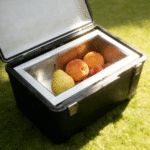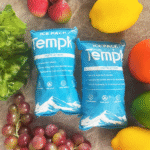La demande mondiale de frais, temperature-sensitive goods has propelled cold insulated food bags into a pivotal role across food delivery, services d'épicerie, et la logistique pharmaceutique. These bags combine advanced insulation, durabilité, and eco-conscious design to ensure product safety while reducing environmental impact. This article explores the latest material innovations, Défis de l'industrie, and Tempk’s cutting-edge solutions redefining portable cold storage.

1. Material Advancements Driving Thermal Efficiency
Modern insulated bags leverage groundbreaking materials to optimize performance:
-
Bio-Based Insulation Layers: Mycelium foam (derived from mushroom roots) fournit 0.032 W/m·K thermal conductivity, rivaling petroleum-based foams while decomposing in 60 jours.
-
Hybrid Phase-Change Liners: Soy wax-PCM composites maintain 0–4 ° C pour 48+ heures, surperformant les emballages de gel traditionnels par 35%.
-
Epp recyclé (Polypropylène expansé): Tempk’s patented EPP blend offers 95% contenu recyclé and 2x the crush resistance of EPS, ideal for reusable designs.
2. Key Applications and Performance Benchmarks
-
Livraison de repas: FDA-approved bags with antimicrobial liners reduce bacterial growth by 99%, keeping meals fresh for 24-hour shipments.
-
E-commerce de l'épicerie: Vacuum-insulated compartments with aerogel panels sustain -18° C pour 72 heures, even in 30°C ambient temperatures.
-
Pharma Transport: WHO-compliant bags using salt hydrate PCMs stabilize 2–8°C pour 120 heures, critical for insulin and vaccines.
3. Défis de durabilité et réponses de l'industrie
-
Obstacles liés aux coûts: Biodegradable materials cost 20–30% more than PVC, but brands like Tempk offset this via circular leasing models.
-
Recycling Limitations: Isolation multicouche (Par exemple, foil-PET) sees <15% tarifs de recyclage. Tempk’s mono-material EPP design achieves 100% recyclabilité en boucle fermée.
-
Empreinte carbone: Gelling Comptes pour 65% of emissions. Solar-powered cold storage hubs cut energy use by 50%.
4. Smart Technologies Reshaping Portable Cooling
-
Intégration IoT: Bluetooth sensors track internal temps (± 0,3 ° C) and alert users via apps for HACCP compliance.
-
Systèmes d'auto-vichage: CO₂ cartridge activation cools bags to 4° C 8 minutes, eliminating pre-freezing needs.
-
AI-Driven Design: Algorithms optimize insulation thickness based on delivery routes, reducing material waste by 25%.
5. Sacs isothermes Tempk: A New Era of Eco-Cooling
Tempk EcoChill Pro Series leads the market with:
-
Triple-Layer EPP Insulation: Maintient 0–4 ° C pour 96 heures—40% longer than competitors—using 100% matériaux recyclés post-consommation.
-
Zero-Waste Ecosystem: À travers le tempk BagReturn Program, 98% of retired bags are refurbished or recycled into raw EPP pellets.
-
Ultra-Lightweight Build: 30% lighter than traditional designs, cutting shipping emissions by 15% per trip.
En fusionnant la durabilité, technologie intelligente, et circularité, Tempk’s bags set the standard for sustainable cold chain portability.























